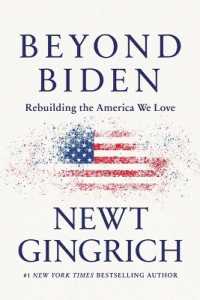Description
Terrorism has long been a major shaping force in the world. However, the meanings of terrorism, as a word and as a set of actions, are intensely contested. This volume explores how literature has dealt with terrorism from the Renaissance to today, inviting the reader to make connections between older instances of terrorism and contemporary ones, and to see how the various literary treatments of terrorism draw on each other. The essays demonstrate that the debates around terrorism only give the fictive imagination more room, and that fiction has a great deal to offer in terms of both understanding terrorism and our responses to it. Written by historians and literary critics, the essays provide essential knowledge to understand terrorism in its full complexity. As befitting a global problem, this book brings together a truly international group of scholars, with representatives from America, Scotland, Canada, New Zealand, Italy, Israel, and other countries.
Table of Contents
Introduction Peter C. Herman; Part I. Origins: The Varieties of Terrorism: 1. Savagery and the sacred: the rhetoric of terror and its consequences in the scriptural monotheisms Reuven Firestone; 2. Early modern terrorism Robert Appelbaum; 3. 'Carrying patriotism in their hearts': the terror in the French Revolution Lindsay Parker; 4. Methodology and martyrs: Irish American Republicanism in the late nineteenth century Gillian O'Brien; 5. 'Play's the thing': how governments in nineteenth and early twentieth century North America used 'terrorism to further their own ends Nathan Greenfield; 6. The nation-state's other: postcolonial terrorism in the Indian context Rini Bhattacharya Mehta; 7. Conflict and violence in the early Northern-Irish troubles Simon Prince; 8. Social-revolutionary violence in Western Europe: the case of the Red Brigades' trajectory, during the 1970s and early 1980s Lorenzo Bosi; 9. Terrorism in the Middle East David Cook; Part II. Development: Terrorism in Literature: 10. Terrorism in literature to 1642 Robert Appelbaum; 11. 'Terror in inquisition': terrorists and inquisitors in the British Gothic literature of the 1790s Joseph Crawford; 12. 'Parliament is burning': dynamite, terrorism and the English novel Deaglán Ó Donghaile; 13. Dostoevsky's terrorism trilogy Lynn Patyk; 14. Perils and pleasures of the bloody oath: the nihilist conspiracy in American popular fiction, 1881–1901 Ann Larabaee; 15. Staging the limit: Albert Camus's just assassins and the il/legitimacy of terrorism Ève Morisi; 16. Gillo Pontecorvo's Battle of Algiers and terrorism on film Tony Shaw; 17. 'Something in the making': writing in the troubles and the singularity of Northern Irish literature Tom Walker; 18. No heroes in a cycle of violence: collaborators, perpetrators and the never-ending terror of the Arab-Israeli conflict Rachel S. Harris; 19. 'Why do they hate us?' Terrorists in American and British fiction of the mid-2000s Michael C. Frank; 20. Terrorism in theory David Simpson; Part III. Applications: Terrorism Today: 21. Sympathy for the devil: evil, taboo, and the terrorist figure in literature Richard Jackson; 22. War after war: terrorism and retaliation in Don DeLillo's Point Omega Linda Kauffman; 23. Conceptual confusion: the ambiguities of the war on terror in Roy-Bhattacharya's The Watch and O'Hagan's The Illuminations Tim Gauthier; 24. Terror, testament, and trial Ian Ward; 25. Global terror/global literature Daniel O'Gorman; 26. Recipient unknown: terrorism and the other in post-9/11 American poetry Ann Keniston; 27. Samson among the terrorologists Peter C. Herman; 28. Afterword Alex Houen.








